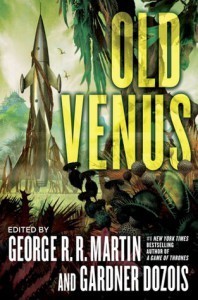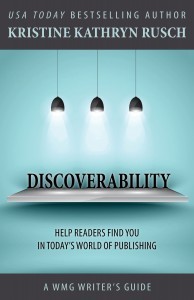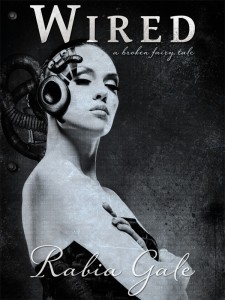Rabia Gale's Blog, page 8
June 1, 2015
may reading roundup
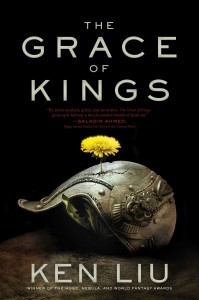 I’d heard a lot of buzz about Ken Liu’s The Grace of Kings, so I was eager to dive into the first book of this Chinese-history-inspired “silkpunk” epic.
I’d heard a lot of buzz about Ken Liu’s The Grace of Kings, so I was eager to dive into the first book of this Chinese-history-inspired “silkpunk” epic.
This book was well-paced; for a big book, it went fast and didn’t get bogged down in the middle. I also appreciated the focus on minor characters from time to time. Even if they disappeared within a few chapters, Liu used them to good effect in showing the scope of the rebellion and its disruptive effects.
On the flip side, it was hard to get attached to any character, including the three major ones. Plus, the ending strongly hinted at a type of inter-family conflict in future books that doesn’t appeal to me. I’d look at a sequel, but it wouldn’t automatically go on my Must Read list.
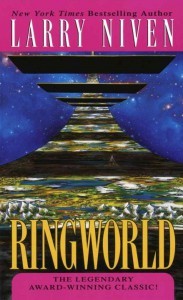 Yes, I confess I’d never read Larry Niven’s Ringworld until last month. I vaguely knew that the Ringworld was an engineered mega-structure which completely ringed its sun, but actually exploring it in this book was enormously satisfying. Might be a theme for the month, but again I found myself caring a lot more about the worldbuilding than about the characters.
Yes, I confess I’d never read Larry Niven’s Ringworld until last month. I vaguely knew that the Ringworld was an engineered mega-structure which completely ringed its sun, but actually exploring it in this book was enormously satisfying. Might be a theme for the month, but again I found myself caring a lot more about the worldbuilding than about the characters.
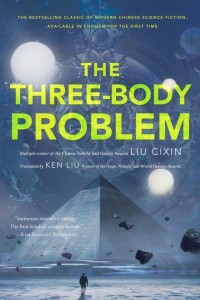 The Three-Body Problem, a translated work by Chinese SF writer Liu Cixin is one of the Hugo nominees for Best Novel. I found it absolutely gripping. Would read the sequel in a heartbeat.
The Three-Body Problem, a translated work by Chinese SF writer Liu Cixin is one of the Hugo nominees for Best Novel. I found it absolutely gripping. Would read the sequel in a heartbeat.
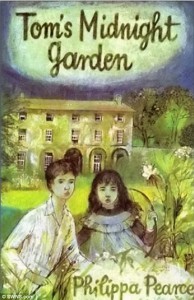 Miss M. is reading this classic British children’s time travel fantasy, so I decided to hop on board this particular train. A very nostalgic book for me, down to the perfectly bittersweet ending, which reminded me of similar works in the genre that I read as a child.
Miss M. is reading this classic British children’s time travel fantasy, so I decided to hop on board this particular train. A very nostalgic book for me, down to the perfectly bittersweet ending, which reminded me of similar works in the genre that I read as a child.
Aside from these, I read through the Hugo nominees for Best Novella and Best Short Story categories.

May 8, 2015
friday fiction
Fairy tales aren’t the only things I break…
The Feline in the Fedora
Come gather around, little children. Never mind the fish—they need their daily twenty minutes of fresh air, didn’t you know? No? Yet another thing the grownups didn’t tell you.
Well, we’ve had fun this rainy, rainy day. Aren’t you glad you opened the door?
But there is something I have to tell you, kidlets.
Sometimes your parents are right. But not for the reasons you think.
They tell you not to jump on the bed, yes? Warn you that you’re going to bump your head and there’ll be blood all over the sheets, the floor, your teddy bear, and you’ll have to go to the hospital and get stitches, just like your Uncle Ernie did when he was four.
What they don’t tell you is that if jump about in that Place of Dreams, your foot’ll punch a hole right through the door. And you’ll tumble right into those beautiful, nasty lands on the other side.
They tell you not to run with scissors. You’ll fall and drive the blades into your knee, they say. Or your foot. Or your eye. That happens, sometimes. Want to see my scar? Cool, isn’t it?
Except they’re not as afraid of you hurting yourself as they are of you putting a tear in the world. Snippety-snip, pokity-poke, and before you know it, purple-spotted monsters and tentacled trees and snake-birds are spilling into your reality.
And they told you not to open the door to the feline in the fedora. Last thing your mom said before she ran out to… where was she going? The gym? The grocery store? Who cares, right?
You thought she didn’t want you to have fun or mess up the house. But what she was really afraid of… well, let me show you. You want to see what’s in these boxes, don’t you?
The one with the clippity-cloppers and the sizzle-snip-snappers? This is Object A.
And that with the buzz-grinders and the buttery-cuttery-knives is Object B.
Stand back, children.
I’m turning them on.

May 3, 2015
april reading roundup
It’s been a long time since I did one of these! It’s been hard making time to read in between all my other busy-ness but I did start on a number of books.
Early on this month, I decided to put on my reading list classics that, for some reason or other, had passed me by (I’m sure we all have those!). Don Quixote is one, as are things like Herodotus’ The Histories and Plutarch’s Lives, and pretty much the majority of the American classics that most Americans read in high school (The Great Gatsby, The Red Badge of Courage, Moby Dick, to name a few).
It’s been a long time since my formal education, so I thought I’d get into a “study literature” mood with some reference books. The two I read bits and pieces of were The Well-Educated Mind: A Guide to the Classical Education You Never Had by Susan Wise Bauer and How to Read a Book by Mortimer J. Adler & Charles Van Doren. I’ve decided that my high schoolers should definitely read the latter before they go off to college.
I was also in the mood for science fiction short stories, so I got a Larry Niven collection and an anthology out of the library.
The anthology is Old Venus, edited by George R. R. Martin and Gardner Dozoir. The premise instantly attracted me: all these stories are set in the Venus of science fictional imaginings–a world of lush tropical jungles and huge oceans–before science revealed it to be the hellish place we known of today. All the stories showed a high level of skill and detailed envy-inducing worldbuilding, so which ones grabbed me and which ones didn’t came down to a matter of taste. My particular favorites were Matthew Hughes’ “Greeves and the Evening Star” and Ian McDonald’s “Botanica Venerica: Thirteen Papercuts by Ida Countess Rathagan”, both of which feature upper-class aristocrats (one English, the other Irish). I’m not sure what that says about me!
Since I published Ironhand, and have other projects in various stages of completion on my plate, I re-read Discoverability by Kristine Kathryn Rusch. This book started life as a series of blog posts that you can still read for free on Rusch’s website. I love Rusch’s approach to writing-as-business. My big takeaways from the book this reading were the WIBBOW test (Would I Be Better Off Writing? In most cases, yes), the necessity of having several books for sale before launching a massive marketing campaign (working on that), and of seeing ones’ books as individual assets and treating them as such.
What about you? Have you read anything good recently?

April 25, 2015
Happy Anniversary, Shattered!
Three years ago, I dipped a toe into the self-publishing waters with Shattered, a collection of three fractured fairy tales.
Since that time, Shattered has become what I fondly refer to as “my little book that could”. It’s sold the most copies, was the first to recoup the small monetary cost I put into it, and still finds its way into new markets.
Shattered was followed up by another broken fairy tale, Wired, about a cybernetic Rapunzel in a post-apocalyptic setting.
Over a year ago, I published another fairy tale collection, Entangled. I didn’t plan this, but all three retellings ended up exploring some variation on the theme of mothers and daughters.
I was in the midst of a burnout, so poor Entangled slipped through the cracks and got no marketing push. I think I even failed to announce its release on this blog. It didn’t have its own page on my site until a week or so ago.
It does now, complete with excerpts from all three stories.
Many, many thanks to Robin Cornett, who designed all three covers and came up with the titles for Shattered and Entangled (including the “broken fairy tales” subtitle).
So, what’s next for the broken fairy tales anthologies? I wanted to write retellings with stronger scifi elements, and happily my muse handed me three more ideas. (She’s used to working in threes when it comes to fairy tales.) I’m especially excited by the one featuring space mercenaries.
I have other projects on my plate, but I’m hoping to squeeze these in around them.
In the meantime, Happy Anniversary, Shattered!

April 21, 2015
scattered
No, that is not the title of the next broken fairy tale anthology, though after Shattered, Wired, and Entangled, such a name would not be a surprise.
Rather, it’s an apt description of my state of mind.
I’m trying to wear a bunch of hats all at once. I’m mom, homeschooler, gardener, housekeeper, writer, publisher, with another handful of part-time jobs thrown in the mix. At any give time, I have a bunch of unconnected thoughts in my head. I can go, for instance, from considering which low-maintenance perennials to plant in a barren shady strip along the side of the house to plotting out a short story set in space to lesson planning in the space of ten minutes.
Yes, it’s disorganized and messy inside my mind, and things have frequently slipped through the cracks. No wonder I feel like I’m constantly jogging in place–or being pulled in different directions by a bunch of strong, feral cats (uh, that analogy didn’t work so well, but indulge me).
I’m working on imposing more order in my life, something which is long overdue! It’s an ongoing process, I’ve found. Everything slips into chaos if one isn’t actively maintaining it (*looks at state of the house*).
Spring is a great time for a renewal, though. I’ve made some small changes to my routines that are already helping, and I have the energy and enthusiasm to see them through.
What about you? For those of you in the Northern Hemisphere (can’t forget that my Australian friends have different seasonal rhythms), what has spring brought you?

April 13, 2015
Ironhand is out
Quick post to let you all know that Ironhand is out at the usual places:
Amazon | Barnes & Noble | Kobo | Smashwords
As my husband pointed out yesterday, I’ve finally written and published a sequel! It’s a weird quirk for a fantasy writer to have, but barring a few shorts featuring one character, all the rest of my stories have stubbornly stood alone. I had not intended to write a sequel to Mourning Cloak, but Kato and Flutter insisted that their story was not yet done.
If you haven’t read Mourning Cloak yet, and want to, here’s a 50%-off coupon code to use at Smashwords: MM83Z (expires May 13th)
Check out an excerpt from Ironhand below the cut:
Flutter is dying.
They all are, these creatures of cool Highwind, withering in the dry heat and the bright light. Eerie men pant in the courtyard of Kaal Baran; cobble crunchers hide in its nooks and crannies. Sera’s altered wind swifts evaporated a long time ago, and the mourning cloaks are spread thin and turned to mist, damp patches on the rocks.
And these are just the survivors.
I gave mercy to many more the day the Gates closed again, in the deepening twilight. I stumbled from one broken body to another, stepping in blue and black and gold blood, the stench of rot in my nose, and dispatched the wounded with a few muttered phrases. Bits of prayers to Taurin, substituting ishtaur for itauri. Replacing darkchild for Taurin’s child, in case he was inclined to be merciful to these poor creatures.
Who am I fooling?
I’m dying, too, trapped in Kaal Baran with an almost-dried up well and barely any food. Well I know that the trip to the nearest settlement is over a week long. Sera expected to be supplied through her portal in Highwind, but that portal is now gone. Flutter and I have looked at the consoles Sera set up in the Chamber of Secrets. We’ve pressed buttons, tugged wires, kicked at the blasted boxes.
All right. I kicked the boxes.
Nothing.
There’s weaponry in other rooms, and a very little store of food. Canned meat for the eerie men and tins of worms for the cobble crunchers. Bags of white crystals for the cloaks—I dump handfuls of it in a trough in the courtyard, then fill it, awkwardly, left-handedly, with water from the well. There’s mud in the water, but the cloaks don’t care. They float in from cracks and mist up out of wall, put their pale faces into the water and feed.
I don’t watch them.
But there is one place I haven’t yet looked at. One place that I never told even Sera about, never mentioned to Flutter, would never go to with an entourage of Highwind creatures dogging my steps and peering over my shoulders—or in the case of cobble crunchers, from behind my legs.
It’s the thought of curious eyes that hold me back from that chamber, I tell myself. Coward, I think a moment later.
No, that place is not meant for failures and blasphemers like me.
Instead, I look for Flutter. She’s not inside the courtyard, of course. No, she’s out in the valley.
The gates of Kaal Baran are open, and I walk down the ramp into the narrow valley. The ground between me and the bronze Gates of Tau Marai, small in the distance, is scuffed and stained from the recent battle. We buried the dead bodies, but the broken bits of golems are still there. I don’t like leaving them, but we haven’t the strength to move them.
We know so little about golems, even after all these years of fighting them. Why shouldn’t they reassemble themselves out of the parts strewn across the battlefield and walk off it?
I pass what looks to be a small grove of bare trees. Night walkers, rooted in the shadow of the canyon wall. They haven’t moved in days. They’re the only part of Sera’s army—now my responsibility—that haven’t tried to kill me, either intentionally or not, nor complained about being hungry or tried to steal my shoes or take over. No, they’ve just stood there and that’s earned them a bucketful of water around their ankles every evening.
Highwind is a place of water. The Salera Desert is not.
Flutter’s a shadow at the foot of the ramp, thin and insubstantial in the hot brightness. I stumble over a stone, and reach out for the wall with my right arm.
Right. I don’t have a hand there anymore.
The stump bangs against the wall, and I lean my shoulder in as I catch my balance. The missing hand weighs down my right arm. Why does absence have so much mass? It almost matches the dark pit in my soul, constantly threatening to drag me down.
I kick pebbles down the ramp as I continue on my way. They skip and skitter almost down to Flutter’s feet, but she pays no mind, intent as she is on a small cloud hovering above the ground.
Bringing back yet another cloak.
I stop behind Flutter, giving her space. The cloud of dust shudders, and slowly forms itself into the shape of a woman.
Her face and body are the color of sand, her features crude and exaggerated, her body a suggestion with no details. She looks like one of those old statues of women dug out of the desert from time to time, ones that are all stylized lines and curves.
She gathers in on herself for one breath. One inhalation, one heartbeat, and she’s a cloak again, pale-faced and dark-eyed, a shiver of dark membranous cloak-wing behind her.
And then she shatters.
I lunge for Flutter—left hand!—grab her shoulder (for a moment my fingers hold cool air), and spin her around and down.
I screw my eyes shut, and a crackle of power surges around us. Particles sting my cheek, burn against my neck. The darkness behind my eyelids turns a dull red which bleeds itself out into blackness.
I peek out through a half-open eye.
The other cloak’s gone.
Flutter flows out of my grasp, and to the place where the other cloak had been. There’s a grey tinge to her white skin, and her eyes look like the holes of masks, showing nothingness. I think I see light glimmering through her, as if she were full of minute holes, and then I don’t look closely any more.
“You should eat,” I tell her roughly. “Or else you’ll disappear, too. Come on.”
Flutter doesn’t answer. She’s still looking at that damn patch of earth.
“I didn’t even know her name,” she says, soft as mist. “But we hatched at about the same time and slept in cells next to each other. She smelled like those purple wildflowers that grow above Highwind in the spring.”
I make a frustrated sound behind my closed lips. “Why do you torture yourself like this? Why bring them back—to all this?” My gesture encompasses city, valley, and fort. “To a place they don’t belong, to the knowledge that memory and identity has been taken from them.”
“Not forever,” says Flutter. “Things that have been taken can be returned. What is lost is found again.”
She sounds more and more eilendi-like every day. Spouting enigmatic proverbs and truisms.
Doesn’t she realize that she’s one of the lucky ones?
Or, the unluckiest. To remember so much about her past life, and yet so little.
“What’s your name?” I ask.
She starts. “My-my what?”
“Flutter is what I called you. You had a name once. What is it?”
Her eyes widen, on the edge of turning into the faceted smoke-dark eyes of a cloak. I tense, and feel my spiders snap to alertness, ready to defend me, weakened as they are.
I push them back down. No transformations.
“I don’t know,” Flutter says at last. “I don’t know.” She shrugs her thin shoulders. “Flutter is as good a name as any for now.”
I know she’s lying.

April 9, 2015
Ironhand: Cover & Blurb
Ironhand is coming soon! (I have the ebook files all ready to upload, something I will do this weekend.) In the meantime, I’m thrilled to share the awesome cover Ravven did (isn’t it gorgeous?):
It’s not over yet.
Kato Vorsok closed the Gates and sealed in the enemies of all mankind. Now he’s stranded in the desert with a ragtag army of supernatural creatures far from home. Keeping order and finding provisions are the extent of his problems.
Or so he thinks.
Because something got out.
Deep in the salt, an ancient demon from a mythic past stirs. Once, angels walked the world and battled such monsters, but they’ve been gone a long time.
Now there’s only Kato, a reluctant hero with no illusions about himself, and Flutter, a woman-turned-demon who’s falling apart.
They won the battle, but will they lose the war—and the whole world with it?
Ironhand is a fantasy novella.

December 6, 2014
Planets Project: behind the scenes
So what does this story have to do with the planet Mars?
My very first thought when thinking about a Mars-inspired piece was was to have a warrior protagonist (gee, I wonder where that came from!). But that felt lazy to me, so I dug deeper and came up with this tale of two sisters, one adored and life-giving, the other twisted, abandoned, and life-destroying.
The story grew out of my thought that Mars is sometimes seen as an ugly stepsister to Earth. There’s this sense that–even with all the enthusiasm for the red planet–it could be something so much more than what it is. In science fiction, Mars is the focus of terraforming efforts or the place where alien life exists or used to exist. So we explore the planet, hoping to find evidence of life and water. Hoping that it’s a place, or will become a place, more like the one that exists in our imaginations.
And somehow that turned into Sisters.
The Mars story is the last of the series that’ll be on the blog. I’ve completed the Jupiter one (which ended up being a lot longer than flash fiction), and am about halfway through the Saturn one. Once I’m done, the entire series will be available as a free e-book for my newsletter subscribers.
If you haven’t subscribed yet, you can do so below:
MailChimp Signup
Thanks for signing up for my mailing list!
Your NameFirstLastYour Email*Mailing Lists*RSS (receive each blog post in your email)NewslettersSign up for one or both!
Like most of you, managing my Inbox can be hard. I, too, have to deal with a large volume of mail. Therefore, I strive to keep my newsletter a low-frequency one.
I will also never sell or give away your email address for ANY reason. I value your privacy.
December 1, 2014
Planets Project: Mars
Sisters
They doubled the guard on the nursery in the wake of the attack, though they know it is too little, too late.
The remnants of the royal clutch lie in the middle of the hatchery. One egg is bright and opalescent, rainbows shifting across its surface. The other is dull and grey, blighted promise across its mottled surface, hard and cracked in places, spongy in others.
All their hopes rest on the egg that survived, whole and unscathed, now that the Queen… no.
Don’t think of it. There is always a Queen. There she is, in the egg.
The priests chant prayers every day. The masses assemble at the mountain’s base, to sing and weep and plead. The broken, fragile magic of all those voices are tossed up to the summit by dry and dusty winds.
They want to protect the Queen egg, lock it away deep underground. Surround it with steel and lasers and traps of all kinds. But their kind has always quickened in eggs bathed in sunshine and drizzled with starlight, rocked by wind and washed in rain.
So they wait, anxious and always hovering.
And one day, the egg trembles, birthing pangs running in wavelets all over its surface. The nurses strain towards it, the guards step forward, but the priest stops them with an upraised hand.
No, the young Queen must do this on her own. If she is to be great, she must learn to be alone.
That is also the way of their kind.
The egg splits open; a lacy arm, glistening with fluid, emerges. The nurses sob. Delicate claws rip again and she unfurls. She stands there, shimmering opal and tall and wise, looking around with her multi-faceted eyes.
The guards shout and their wordless rapture is carried by the winds to the people down the mountain. The rejoicing begins.
The new Queen is an island of stillness in the midst of it all. She reaches out a hand, softly, slowly, as if breaking through a bubble and into this new world. Touches a pedestal with a withered plant at the top. Under her fingers, a new flower unfurls and reaches for the sky.
The priest sighs, drops his head into his hands for a moment as he masters himself. Then he calls out, loud and clear, “The Queen lives! The Queen is whole! The Queen is power!”
And while the nurses rush to their new mistress, the priest beckons to a guard. The second egg, the one that almost didn’t make it, rocks urgently, futilely. The thing inside is alive, a writhing shadow inside hardened translucence.
“Poor youngling,” says the priest. His voice is kind, but firm. “Cast it into the ravine. Put it out of its misery.”
The guard nods, stoops. He is unnoticed by all as he covers the egg with a black cloth and hastens out a back entrance. A short tunnel later, he stands on a ledge, looks down at the steep drop. The egg in his arms trembles more violently, as if the deformed thing inside knows what is about to happen.
The guard thinks he should say something, something to mark the end of this creature, whose life is over before it even begins. This creature whose womb is also its tomb.
He cannot think of a single word, so he mutters a general blessing, and drops the egg.
He does not stay to watch it fall, hurrying back to kneel at the feet of his new Queen.
*
The egg shivers at the bottom of the ravine. Its fluttering attracts the attention of a bird, one that swoops lazily down to investigate. It stands on the egg, cocks its head. Gives an experimental peck, or two.
The leathery shell is tough, but the bird’s beak slices through. It dips its head for yet another peck, but sounds explode nearby. The people are setting off firecrackers, but the bird is already startled and away, thoughts of the egg driven completely out of its skull.
The egg lies still as if the creature within gathers its strength. Then, with one lunge, two sticklike hands emerge from the rip and push. With a gloop and swish, the shell gives way.
And the Queen’s sister tumbles out in a spreading pool of thick, foul-smelling liquid. She is the color of curdled milk and grey cobweb. Strands of mucous stick to her short buzzed hair and dead-looking skin. She tries to move, to stand, but ends up collapsed. Her limbs shake; she can barely control them.
She grabs for a straggly thornbush, to pull herself forward. The hardy plant withers to brown and crumbles to dust and vanishes between her fingers.
The sister rests. She knew that it is wrong for her to smell so, to look so, to affect the world so.
She could die right now, under this burning sun.
But she wants to live and after a while, she pushes herself forward, slowly, painfully, on her belly.
She leaves behind her a trail of dead grass.

November 26, 2014
wednesday progress update
Made my deadline! Ironhand revision is 92/92 pages complete.
I still need to do a line/copy edit. But the hard part is over. Whew.



